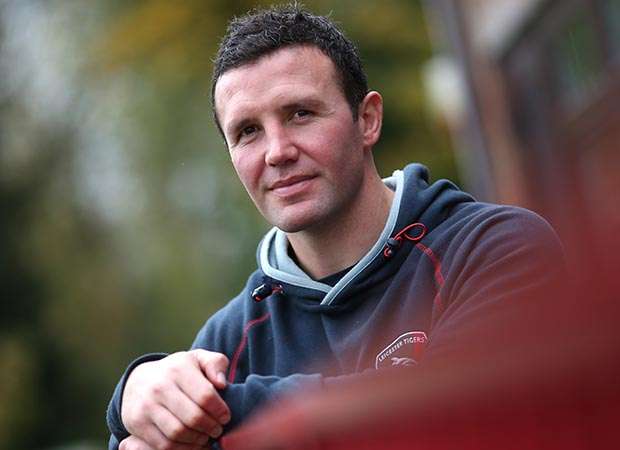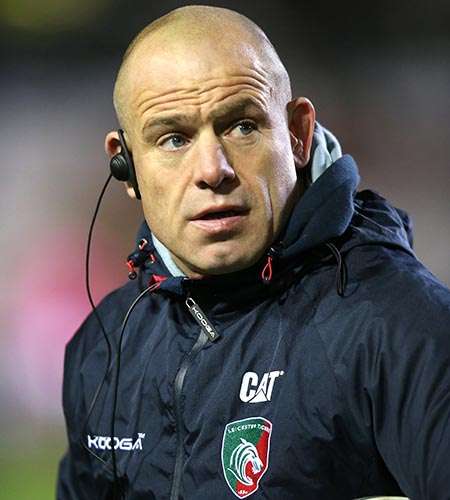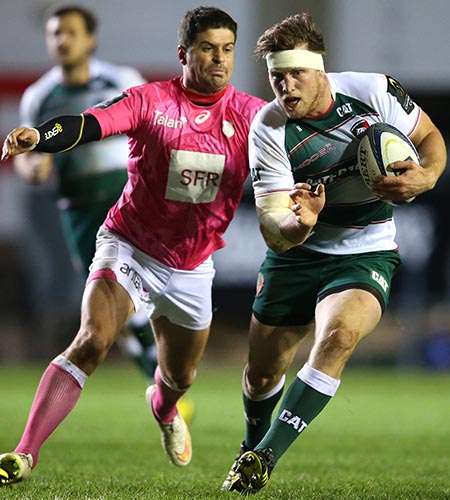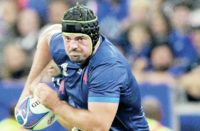 Aaron Mauger may not have moved mountains yet, but Leicester's new Kiwi head coach has already achieved something close to it at Welford Road. No sooner had the 45-cap former All Black centre arrived back at Leicester to begin his second stint with the club in June – his first innings as a player having ended five years ago – than the groundsman was instructed to restore the pitch to full size.
Aaron Mauger may not have moved mountains yet, but Leicester's new Kiwi head coach has already achieved something close to it at Welford Road. No sooner had the 45-cap former All Black centre arrived back at Leicester to begin his second stint with the club in June – his first innings as a player having ended five years ago – than the groundsman was instructed to restore the pitch to full size.
Mauger's mission statement could not have been more groundbreaking. He is here to bring some All Black magic to Leicester by freeing them up as an attacking force – and he is clearly no disciple of the ‘incredible shrinking pitch' antics favoured by most of his Tigers coaching antecedents, including rugby director Richard Cockerill.
Mauger cuts to the chase regarding the transformation of the sticky, undersized Leicester playing surface into a full-sized pitch suitable for running rugby. “It was always part of the plan for the club if we are to evolve our game, and it's part of my philosophy to use every blade of grass available. We aim to grow our game-understanding and skill sets, and it gives us the ability to do that.”
Ask Mauger for the new pitch dimensions, and he says: “It's maybe four to five metres longer and three to four metres wider – which is about 98 metres long, and the full width.”
The benefits are writ large in an impressive start the season, with five wins from six (with the only blemish a narrow defeat at Exeter), including a European Cup flourish a fortnight ago at home against French champions Stade Francais. This saw a Leicester side bolstered by summer signings hand-picked by Mauger – with former Wallaby wing Peter Betham, and two Kiwis, openside Brendon O'Connor and lock Mike Fitzgerald, in the vanguard – romp to a four-try 33-20 bonus point win over Stade.
There is an unmistakable message in this for Bath, who visit the Tigers lair today, having perhaps unwittingly set the Mauger revolution in motion when they ran riot in the wide open spaces at The Rec to overwhelm Leicester 47-10 in the Premiership semi-finals last May.
The arch-enemies have not met since, and although Mauger is too canny an operator to make Bath the focus of his remarks, Leicester's desire for revenge is a given. They are also better prepared to meet fire with fire when it comes to covering the ground.
Mauger says: “Now the boys don't really notice when they go from our pitch to another pitch.
“In the past it was noticeably different when you played at Welford Road and then went elsewhere – like Gloucester or Exeter – where the pitches are so much bigger. It probably doesn't sound like it's that much (bigger), but when it's about territory battles and you're kicking from your own 22 into the far 22, which was quite easy in the past, now it's much harder to get out of your own half.”
The other part of Mauger's pitch transformation is getting the Tigers squad that plays on it fit for purpose, so that they're using the sabre and the cavalry charge – as opposed to siege-warfare in the mud – to overwhelm their opponents.
 “We've looked at the way we train our guys, and we are keeping them on their feet a bit more and getting them to run more dynamically. The new strength and conditioning coach, Alex Martin, has been instrumental in allowing us to make a few shifts in training. The roles we are asking our players to take on are probably more dynamic. This means that they are getting fitter around the way we are playing – and the mind-set has also changed, allowing us to work that bit harder.”
“We've looked at the way we train our guys, and we are keeping them on their feet a bit more and getting them to run more dynamically. The new strength and conditioning coach, Alex Martin, has been instrumental in allowing us to make a few shifts in training. The roles we are asking our players to take on are probably more dynamic. This means that they are getting fitter around the way we are playing – and the mind-set has also changed, allowing us to work that bit harder.”
The New Zealander, who was forced into retirement when a back injury in 2010 brought his influential Premiership-winning playing career at Leicester to a premature end, is young for a head coach at 35.
However, having returned to his native Christchurch to do his coaching apprenticeship with the Crusaders over the last five years, he says he has no difficulty taking charge of a squad which includes a handful of veterans he played alongside at Welford Road, with Tom Croft, Marcos Ayerza, Dan Cole, Jordan Crane, Matt Smith among them.
“I've been a professional coach for five years, and a lot of them were younger boys when I was at the club. There are still some old team-mates, but I've taken on a different role, and they are supporting me in that role.”
Ask Mauger about what has changed at Leicester in the interim, and how it compares with the Crusaders, and he says that there are more similarities than differences.
“People expect you to win. The expectations of the fans, and the organisation, at Tigers and the Crusaders, is to win trophies. Both are proud rugby clubs with strong histories, but they are also humble and let their actions do the talking. Every club evolves, but some of the strengths of the Tigers that have worked for the club historically are still here, which is good.”
However, it is good influences from the outside, with New Zealand the market leaders in attacking know-how, which has been instrumental in Leicester knocking on Mauger's door. Certainly, the coaches that he can count as being influential in his career development read like a Who's Who of All Black rugby.
“I've been very lucky in the coaches who have been instrumental in shaping the way I see the game both as a player and a coach, whether Robbie Deans, Wayne Smith, Steve Hansen, Graham Henry, and over the last few years at the Crusaders, Tabai Matson and Todd Blackadder. The list is quality, and I appreciate them all, and I've also benefited from great NZRFU coaching development support.”
He adds that the key element in the transition from playing to coaching is communication. “It is about delivery of the messages. A lot of ex-players have the knowledge, but trying to get that across is a real skill. In many ways it's about learning the art of teaching, and I've been fortunate to observe a lot of good coaches as a player, and I've taken bits and pieces and moulded it into my own philosophy of the game, and how I want to communicate that.”
However, Mauger is reluctant to endorse the suggestion that the task of up-and-coming coaches may be easier in New Zealand than it is north of the equator because of the quality of the playing skills.
 “The way they play in the Northern Hemisphere now, the gap with the Southern Hemisphere has definitely closed. Ten years ago there was a massive difference in ability, skills and athletes, but there's been a big shift in approach in England recently, and you see players who are more capable of playing an open game now.”
“The way they play in the Northern Hemisphere now, the gap with the Southern Hemisphere has definitely closed. Ten years ago there was a massive difference in ability, skills and athletes, but there's been a big shift in approach in England recently, and you see players who are more capable of playing an open game now.”
He says that on his watch Leicester will be part of that shift. “You look at growing the squad over the next three to five years and making sure you have the right athletes on the field to play the type of game you want. It's also important for us mentally to get the right mix across the squad, and to put a big focus on ball retention and making sure we service the areas we need to – and bring in the dynamics we need to – to make ourselves better.”
With O'Connor (ex-Auckland Blues) showing promising signs as a ball-winning and linking openside, Fitzgerald (ex-Waikato Chiefs) and the powerful Mike Williams (ex-Worcester) bringing added clout to the back five of the pack, and Betham to be joined by Springbok skipper Jean de Villiers and Manu Tuilagi once they are free of injury, it's no mystery why Mauger is confident Leicester can make an impact on all fronts.
“We have the ability to challenge any of the best teams. In six-month time we want to have earned the right to call ourselves one of the best teams in this part of the world. We've had some good results already, and the upside is that we are only 50 per cent of the way there. The exciting thing is that there is so much more ability for us to grow.”
As for Mauger's own motivation, having had almost an 87 per cent win record for New Zealand before being dropped controversially for the 2007 World Cup quarter-final defeat by France, as well as winning four Super titles with the Crusaders and a Premiership title with Leicester (2009), he provides this insight into what makes him tick.
“I'm a very competitive person and I love winning anything. Winning is a product of how good your process is, and it's a reflection of the work you've put in. So, if you get a result at the end of a long hard season – knowing you've worked hard as a team and nailed those key moments – then, when you get to the top of the mountain, it's the greatest feeling of fulfilment you can get as a sportsman.”
Mauger has made his pitch on his return to Welford Road in more ways than one, and winning is what he craves.


























